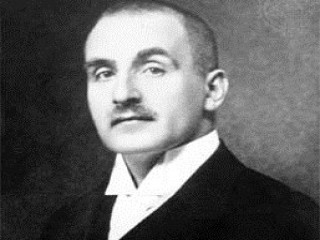
Frank Wedekind biography
Date of birth : 1864-07-24
Date of death : 1918-03-09
Birthplace : Hanover, Germany
Nationality : German
Category : Famous Figures
Last modified : 2011-04-27
Credited as : Dramatist, cosmopolite ,
The German dramatist, cosmopolite and libertarian Frank Wedekind was a foe of middle-class hypocrisy and a moralist eager to reform the world through sexual emancipation.
Frank Wedekind was born Benjamin Franklin Wedekind on July 24, 1864, in Hanover, Germany. He was the son of a German who had emigrated to America, practiced medicine in San Francisco, then returned to his home in Germany. Dissatisfied with Otto von Bismarck's Prussian policy, the elder Wedekind left again and settled in Switzerland, where his son grew up. After working as a freelance journalist, an advertising copywriter, and a secretary for a circus, and spending long sojourns as a painter in England and France, young Wedekind moved to Munich, joining the staff of the satirical magazine Simplizissimus, in which his first political poems appeared. He remained in Munich until his death, occasionally making guest appearances in his own plays, giving public readings, and reciting and singing his ballads in a famous cabaret called Die Elf Scharfrichter (Eleven Executioners).
Wedekind's psychological insight into daydreams, emotions, and conversations among adolescents is reflected in his first successful play, Frahlings Erwachen (1891; The Awakening of Spring). Here he developed his own dramatic style and technique, characterized by many short and loosely connected scenes, calling to mind George Bachner's Wozzek and, in his frank exposure of sexual problems, anticipated many of the later insights of modern depth psychology. Wedekind's next major work was a "monster tragedy" consisting of two parts: Erdgeist (1893; Earth Spirit) and Bachse der Pandora (1906; Pandora's Box). Significantly, its central character, Lulu, the femme fatale, has no second name; indeed, even her first name changes with each suitor. Representing pure instinct, lust, desire, and flesh, she destroys each man who pursues her. It was the final act of part II, set in London and written in English for reasons of censorship, with Lulu as a prostitute supporting her father and her lover Alwa, which won for Wedekind his reputation as an immoralist and pornographic enemy of society.
Of Wedekind's plays, one relatively widely known in the United States is his character study, Der Kammersänger (1897; The Tenor). In a hotel room the hero, the famous tenor Gerardo, receives in turn a number of unwelcome guests: a 16-year-old girl admirer, an old composer anxious to get his opera produced, and finally a married woman who, refused by Gerardo, commits suicide. Der Kammersanger was followed, in 1900, by a full-length play in five acts, Der Marquis von Keith, which deals not with an adventurer in love but with an adventurer of life, a reckless swindler and social climber involved in shady financial dealings.
These five works mark Wedekind's first and most important creative period. After the turn of the century, he became more and more autobiographical, feeling an urge to "explain" himself and his work and to defend his ideas against the attacks leveled against him from all sides. Among the plays of this period are Karl Hetman der Zwergriese (1900; Hidalla) and Konig Nicolo oder So ist das Leben (1905; Such Is Life). These years were marked by critical abuse, censorship (he once spent 6 months in jail for le‧se majeste), and difficulties with his publishers.
After the publication of Nicolo, Wedekind's dramatic art deteriorated. Totentanz (1905; The Dance of Death) and Schloss Wetterstein (1910; Hunted by Every Hound) both deal with prostitution, while Zensur (1907; Censorship) is purely autobiographical. His last play, Bismarck (1916), is hopelessly dull and undramatic.
Wedekind is also remembered for his short, pointed tales, reminiscent of Heinrich von Kleist and Guy de Maupassant. Here again, as in his dramas, his theme is love and eros. One of the best prose tales in modern German literature is his story Der Brand von Egliswyl (1905; The Fire of Egliswyl), which reveals his psychological insight into the relationship between arson and sexual anxiety. And he was a master, as well, of slightly frivolous, mocking, flirtatious love songs and ballads, some of which call to mind Heinrich Heine. Wedekind died in Munich on March 9, 1918.
















